On 9 March 2022, the University of Oxford’s Smith School of Enterprise and the Environment (SSEE) and Oxford Net Zero (ONZ) held a joint masterclass on policy interventions for accelerating the transition to net zero, hosted by Apolitical. This was held in the lead up to releasing our new Reaching Net Zero online short course for public servants.
4 leading experts in Net Zero were invited to deliver presentations to 90 policymakers and public servants in attendance:
- Chris Stark, Chief Executive of the UK Climate Change Committee (CCC)
- Dr Matthew Ives, complex systems modeler at the Oxford Martin Post-Carbon Transition Programme, University of Oxford
- Kaya Axelsson, Net Zero Policy Engagement Fellow, ONZ
- Professor Sam Fankhauser, Research Director, ONZ
For those who missed it, here are 5 key takeaways from the event:
(1) UK’s path to Net Zero is a financing challenge
In his presentation, Chris Stark outlined 4 key areas of the UK’s policy action and their respective contribution to net zero:
- Demand reduction and efficiency
- Take-up of low carbon solutions
- Expansion of low carbon energy
- Offsetting emissions
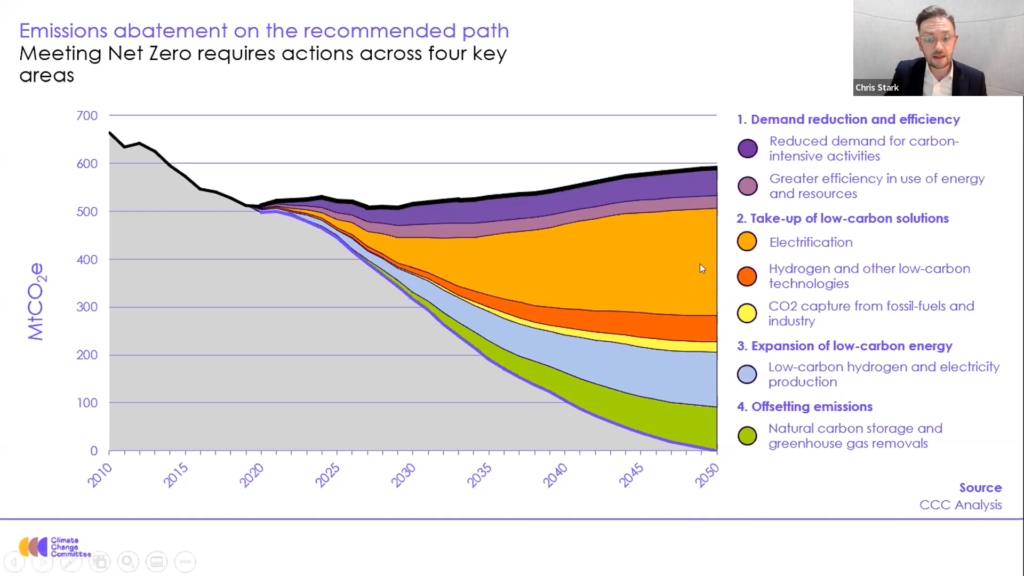

Most of these shifts will be driven by the private sector. The role of the public sector is then to craft policies that maintain the investments over the transition towards a low-carbon future.
“The challenge here is an investment one. We’ve got high capital expenditure upfront but then we see savings from using the capital assets and technologies that have replaced the fossil-fuel ones. That is a financing challenge, rather than a funding challenge. That means you can put policy around that, it will encourage people to see make the switches and see a benefit in the short-term for them.” – Chris Stark
(2) Strong policy intervention today is crucial to move the net zero needle
Sensitive Intervention Points (SIPs) can be harnessed to drive climate action at the speed and scale we need to achieve net zero targets. Policies enacted through SIPs translate to ‘kicks’ and ‘shifts’ in the system, triggering positive feedbacks that amplify growth in climate mitigation.
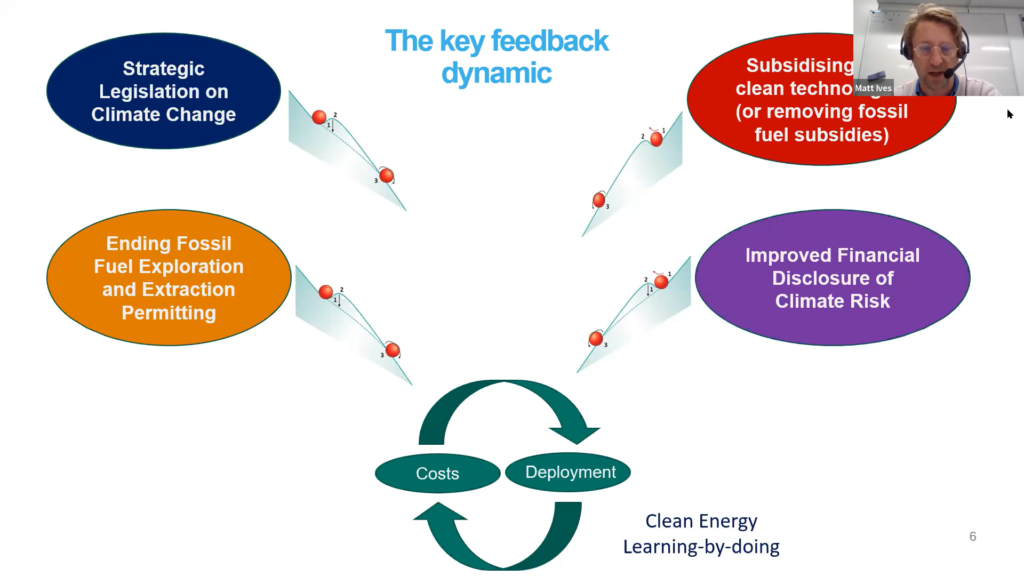

Dr Matthew Ives identified 4 SIPs to boost the adoption of clean energy – a key climate mitigation strategy. These SIPs trigger a positive feedback mechanism (learning-by-doing) that drives reductions in cost while reinforcing deployment:
- Strategic legislation on climate change (shift)
- Ending fossil fuel exploration/extraction permitting (shift)
- Subsidizing clean tech or removing fossil fuel subsidies (kick)
- Improving financial disclosure of climate risks (shift)
The study of SIPs suggests that policy interventions are time-sensitive. A window of opportunity exists today for us to trigger that large change with smaller shifts in our policy. Incentivizing a fast transition to clean today can increase our savings by $26 trillion (by 2070). The message is clear – the time to act is now.
(3) ‘SCORE’ your net zero strategy
When it comes to net zero strategies, the devil is in the details. Despite impressive growth in emissions coverage across net zero ambitions in the past decade, there have been wide variations in terms of scope (Scope 1,2 and 3) and coverage of greenhouse gases undermining net zero efforts. To address this, Kaya Axelsson recommended the SCORE (Scope, Coverage, Offsetting, Reporting and Accountability, Equity) framework to assess net zero commitments and strategies.
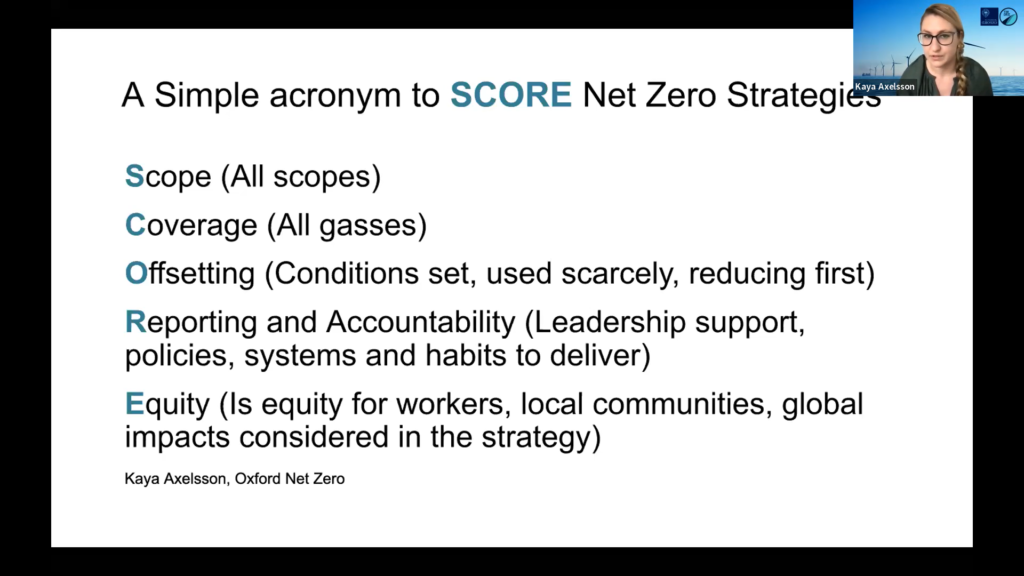

Policymakers can use SCORE to assess, scrutinize and evaluate their own (or someone else’s) net zero strategy. By identifying weaknesses or gaps, policymakers can then push for greater ambition in the race to net zero.
(4) Voluntary initiatives are a useful resource
Kaya Axelsson encouraged policymakers to reference voluntary initiatives (such as the International Sustainability Standards Board) that are establishing and compiling new standards for regulation. Using these initiatives, governments can take the lead to establish environmental targets that set the tone for business climate action.
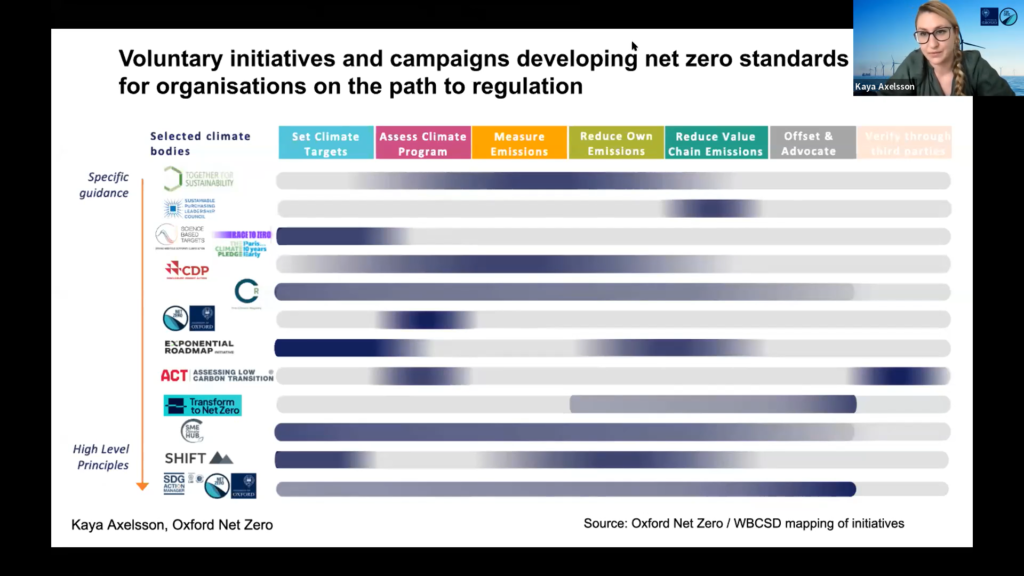

With predictable, regulated environmental targets, businesses are more likely to follow suit with long-term ambitious science-based targets and growth strategies aligned with a net zero future.
(5) No silver bullet – a portfolio of policy interventions is needed
There is no single policy to achieve net zero. Rather, Professor Sam Fankhauser called for a package of policy interventions to (1) address the climate change externality, (2) remove associated barriers to adopting clean energy and (3) mitigate unintended consequences from deep structural transitions.
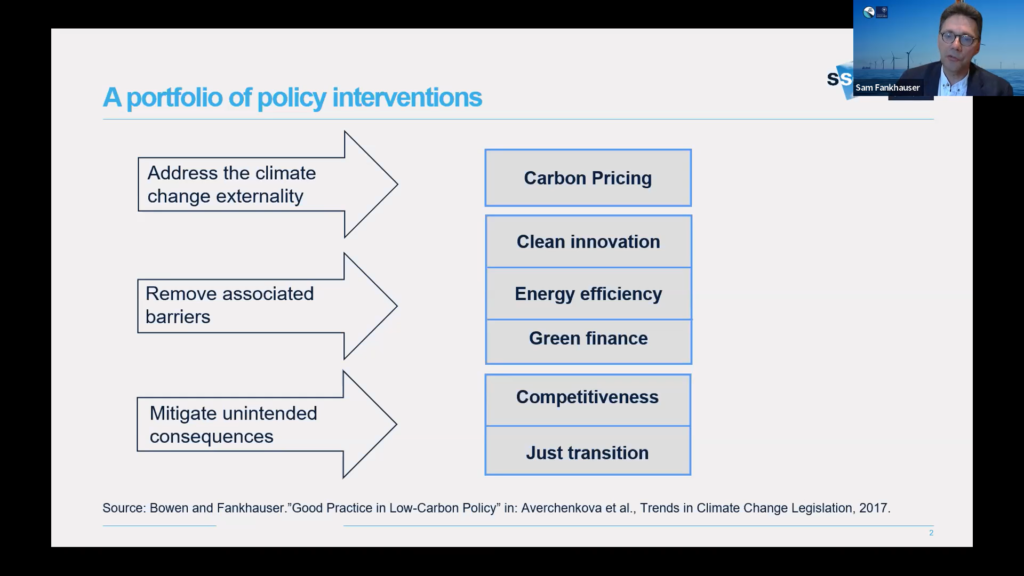

Importantly, policies should be embedded within legal frameworks such as the constitution or an act (i.e. UK Climate Change Act 2008). These frameworks provide the regulatory mechanisms to implement and track these policies, ensuring effectiveness and accountability.
A full recording of the session can be found here.
Interested to learn more? Oxford Net Zero and SSEE, in partnership with Apolitical, will be delivering a Reaching Net Zero online short course from 22nd April – 30th May 2022. This course, specially designed for public servants around the world, will cover the science of net zero, possible pathways to achieving net zero, and strategies to overcome resistance against net zero.


